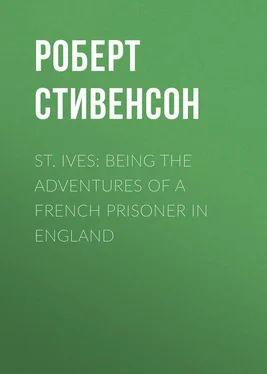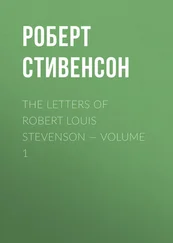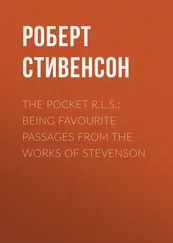Роберт Стивенсон - St. Ives - Being the Adventures of a French Prisoner in England
Здесь есть возможность читать онлайн «Роберт Стивенсон - St. Ives - Being the Adventures of a French Prisoner in England» — ознакомительный отрывок электронной книги совершенно бесплатно, а после прочтения отрывка купить полную версию. В некоторых случаях можно слушать аудио, скачать через торрент в формате fb2 и присутствует краткое содержание. Жанр: literature_19, foreign_antique, foreign_prose, на английском языке. Описание произведения, (предисловие) а так же отзывы посетителей доступны на портале библиотеки ЛибКат.
- Название:St. Ives: Being the Adventures of a French Prisoner in England
- Автор:
- Жанр:
- Год:неизвестен
- ISBN:нет данных
- Рейтинг книги:5 / 5. Голосов: 1
-
Избранное:Добавить в избранное
- Отзывы:
-
Ваша оценка:
- 100
- 1
- 2
- 3
- 4
- 5
St. Ives: Being the Adventures of a French Prisoner in England: краткое содержание, описание и аннотация
Предлагаем к чтению аннотацию, описание, краткое содержание или предисловие (зависит от того, что написал сам автор книги «St. Ives: Being the Adventures of a French Prisoner in England»). Если вы не нашли необходимую информацию о книге — напишите в комментариях, мы постараемся отыскать её.
St. Ives: Being the Adventures of a French Prisoner in England — читать онлайн ознакомительный отрывок
Ниже представлен текст книги, разбитый по страницам. Система сохранения места последней прочитанной страницы, позволяет с удобством читать онлайн бесплатно книгу «St. Ives: Being the Adventures of a French Prisoner in England», без необходимости каждый раз заново искать на чём Вы остановились. Поставьте закладку, и сможете в любой момент перейти на страницу, на которой закончили чтение.
Интервал:
Закладка:
Robert Louis Stevenson
St. Ives: Being the Adventures of a French Prisoner in England
CHAPTER I – A TALE OF A LION RAMPANT
It was in the month of May 1813 that I was so unlucky as to fall at last into the hands of the enemy. My knowledge of the English language had marked me out for a certain employment. Though I cannot conceive a soldier refusing to incur the risk, yet to be hanged for a spy is a disgusting business; and I was relieved to be held a prisoner of war. Into the Castle of Edinburgh, standing in the midst of that city on the summit of an extraordinary rock, I was cast with several hundred fellow-sufferers, all privates like myself, and the more part of them, by an accident, very ignorant, plain fellows. My English, which had brought me into that scrape, now helped me very materially to bear it. I had a thousand advantages. I was often called to play the part of an interpreter, whether of orders or complaints, and thus brought in relations, sometimes of mirth, sometimes almost of friendship, with the officers in charge. A young lieutenant singled me out to be his adversary at chess, a game in which I was extremely proficient, and would reward me for my gambits with excellent cigars. The major of the battalion took lessons of French from me while at breakfast, and was sometimes so obliging as to have me join him at the meal. Chevenix was his name. He was stiff as a drum-major and selfish as an Englishman, but a fairly conscientious pupil and a fairly upright man. Little did I suppose that his ramrod body and frozen face would, in the end, step in between me and all my dearest wishes; that upon this precise, regular, icy soldier-man my fortunes should so nearly shipwreck! I never liked, but yet I trusted him; and though it may seem but a trifle, I found his snuff-box with the bean in it come very welcome.
For it is strange how grown men and seasoned soldiers can go back in life; so that after but a little while in prison, which is after all the next thing to being in the nursery, they grow absorbed in the most pitiful, childish interests, and a sugar biscuit or a pinch of snuff become things to follow after and scheme for!
We made but a poor show of prisoners. The officers had been all offered their parole, and had taken it. They lived mostly in suburbs of the city, lodging with modest families, and enjoyed their freedom and supported the almost continual evil tidings of the Emperor as best they might. It chanced I was the only gentleman among the privates who remained. A great part were ignorant Italians, of a regiment that had suffered heavily in Catalonia. The rest were mere diggers of the soil, treaders of grapes or hewers of wood, who had been suddenly and violently preferred to the glorious state of soldiers. We had but the one interest in common: each of us who had any skill with his fingers passed the hours of his captivity in the making of little toys and articles of Paris ; and the prison was daily visited at certain hours by a concourse of people of the country, come to exult over our distress, or – it is more tolerant to suppose – their own vicarious triumph. Some moved among us with a decency of shame or sympathy. Others were the most offensive personages in the world, gaped at us as if we had been baboons, sought to evangelise us to their rustic, northern religion, as though we had been savages, or tortured us with intelligence of disasters to the arms of France. Good, bad, and indifferent, there was one alleviation to the annoyance of these visitors; for it was the practice of almost all to purchase some specimen of our rude handiwork. This led, amongst the prisoners, to a strong spirit of competition. Some were neat of hand, and (the genius of the French being always distinguished) could place upon sale little miracles of dexterity and taste. Some had a more engaging appearance; fine features were found to do as well as fine merchandise, and an air of youth in particular (as it appealed to the sentiment of pity in our visitors) to be a source of profit. Others again enjoyed some acquaintance with the language, and were able to recommend the more agreeably to purchasers such trifles as they had to sell. To the first of these advantages I could lay no claim, for my fingers were all thumbs. Some at least of the others I possessed; and finding much entertainment in our commerce, I did not suffer my advantages to rust. I have never despised the social arts, in which it is a national boast that every Frenchman should excel. For the approach of particular sorts of visitors, I had a particular manner of address, and even of appearance, which I could readily assume and change on the occasion rising. I never lost an opportunity to flatter either the person of my visitor, if it should be a lady, or, if it should be a man, the greatness of his country in war. And in case my compliments should miss their aim, I was always ready to cover my retreat with some agreeable pleasantry, which would often earn me the name of an ‘oddity’ or a ‘droll fellow.’ In this way, although I was so left-handed a toy-maker, I made out to be rather a successful merchant; and found means to procure many little delicacies and alleviations, such as children or prisoners desire.
I am scarcely drawing the portrait of a very melancholy man. It is not indeed my character; and I had, in a comparison with my comrades, many reasons for content. In the first place, I had no family: I was an orphan and a bachelor; neither wife nor child awaited me in France. In the second, I had never wholly forgot the emotions with which I first found myself a prisoner; and although a military prison be not altogether a garden of delights, it is still preferable to a gallows. In the third, I am almost ashamed to say it, but I found a certain pleasure in our place of residence: being an obsolete and really mediaeval fortress, high placed and commanding extraordinary prospects, not only over sea, mountain, and champaign but actually over the thoroughfares of a capital city, which we could see blackened by day with the moving crowd of the inhabitants, and at night shining with lamps. And lastly, although I was not insensible to the restraints of prison or the scantiness of our rations, I remembered I had sometimes eaten quite as ill in Spain, and had to mount guard and march perhaps a dozen leagues into the bargain. The first of my troubles, indeed, was the costume we were obliged to wear. There is a horrible practice in England to trick out in ridiculous uniforms, and as it were to brand in mass, not only convicts but military prisoners, and even the children in charity schools. I think some malignant genius had found his masterpiece of irony in the dress which we were condemned to wear: jacket, waistcoat, and trousers of a sulphur or mustard yellow, and a shirt or blue-and-white striped cotton. It was conspicuous, it was cheap, it pointed us out to laughter – we, who were old soldiers, used to arms, and some of us showing noble scars, – like a set of lugubrious zanies at a fair. The old name of that rock on which our prison stood was (I have heard since then) the Painted Hill . Well, now it was all painted a bright yellow with our costumes; and the dress of the soldiers who guarded us being of course the essential British red rag, we made up together the elements of a lively picture of hell. I have again and again looked round upon my fellow-prisoners, and felt my anger rise, and choked upon tears, to behold them thus parodied. The more part, as I have said, were peasants, somewhat bettered perhaps by the drill-sergeant, but for all that ungainly, loutish fellows, with no more than a mere barrack-room smartness of address: indeed, you could have seen our army nowhere more discreditably represented than in this Castle of Edinburgh. And I used to see myself in fancy, and blush. It seemed that my more elegant carriage would but point the insult of the travesty. And I remembered the days when I wore the coarse but honourable coat of a soldier; and remembered further back how many of the noble, the fair, and the gracious had taken a delight to tend my childhood… But I must not recall these tender and sorrowful memories twice; their place is further on, and I am now upon another business. The perfidy of the Britannic Government stood nowhere more openly confessed than in one particular of our discipline: that we were shaved twice in the week. To a man who has loved all his life to be fresh shaven, can a more irritating indignity be devised? Monday and Thursday were the days. Take the Thursday, and conceive the picture I must present by Sunday evening! And Saturday, which was almost as bad, was the great day for visitors.
Читать дальшеИнтервал:
Закладка:
Похожие книги на «St. Ives: Being the Adventures of a French Prisoner in England»
Представляем Вашему вниманию похожие книги на «St. Ives: Being the Adventures of a French Prisoner in England» списком для выбора. Мы отобрали схожую по названию и смыслу литературу в надежде предоставить читателям больше вариантов отыскать новые, интересные, ещё непрочитанные произведения.
Обсуждение, отзывы о книге «St. Ives: Being the Adventures of a French Prisoner in England» и просто собственные мнения читателей. Оставьте ваши комментарии, напишите, что Вы думаете о произведении, его смысле или главных героях. Укажите что конкретно понравилось, а что нет, и почему Вы так считаете.












